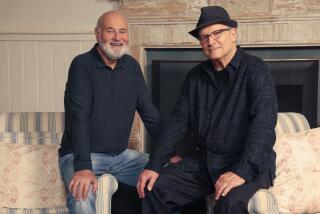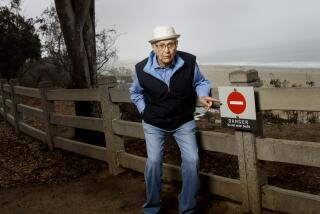Peter Barnes, 73; Wrote ‘The Ruling Class’
- Share via
Peter Barnes, the British playwright, screenwriter and director best known for his 1968 play “The Ruling Class,” a satirical attack on the church and British aristocracy that he later adapted for the screen, died Thursday in a London hospital. He was 73.
Barnes, who delivered two screenplays this week, was hospitalized two days ago after a heart attack, said his friend, writer-producer Judd Bernard. A late-in-life father, Barnes leaves behind 19-month-old triplets and a 4-year-old daughter.
The London-born writer was one of the United Kingdom’s most respected dramatists, with dozens of stage, screen and radio plays to his credit.
Barnes first came to prominence in England with “The Ruling Class,” for which he won the John Whiting Playwrights Award and the Evening Standard Annual Drama Award for most promising playwright. The 1972 movie version of the black comedy about the heir to a British lordship who thinks he’s Jesus Christ earned actor Peter O’Toole an Academy Award nomination.
“The rejection of authority and the scourging of corruption,” as an Irish journalist once put it, run throughout Barnes’ work, including “The Ruling Class.”
He won the Olivier Award for play of the year for “Red Noses,” a 1985 black comedy set in 14th-century France at the height of the Black Plague.
He was nominated for an Academy Award in 1993 for his adaptation of Elizabeth von Arnim’s novel “Enchanted April,” a comedy of manners about four women renting an Italian villa in the 1920s.
Other award-winning works include his adaptations of Charles Dickens’ “Hard Times,” which he directed for British television, and “Nobody Here But Us Chickens,” a British Television Society Award winner.
Barnes also wrote for American television miniseries, including “Noah’s Ark,” “Merlin” and “Arabian Nights.”
The reference book Contemporary Dramatists describes Barnes as “one of the most consistently exciting and inventive of contemporary playwrights, a savage satirist and a glorious free-booter of past theatrical styles.”
“He was such a brilliant writer and such an incredible man,” longtime friend Peter Medak, who directed the screen version of “The Ruling Class,” told The Times on Thursday.
“I feel it’s an end of a whole era, because there are very few writers like him nowadays,” Medak said. “He was a very gentle person with the most incredibly wonderful, vitriolic sense of humor.”
Bernard agreed.
“He was a wonderful satirical writer,” he said, citing “Red Noses” as well as “The Bewitched,” a black comedy about the Spanish Inquisition, and “Laughter,” a controversial black comedy set partly during the Holocaust. It features two old Jewish comics cracking jokes as they are led to the gas chamber -- jokes reportedly actually told at Auschwitz during World War II.
“What I discovered in this case is that the idea of humor alleviating misery was deeply wrong. It can actually perpetuate it,” Barnes told the Minneapolis Star-Tribune in 1988. “As a Jew myself, I often wonder if it wasn’t that wonderful strain of Jewish humor that helped lead to the Holocaust. Maybe it’s better if we think before we laugh.”
One way he got audiences to see tragedy beneath comedy was to push his characters to extremes. One character in “Laughter” is such a zealous Nazi that he begins to question whether Hitler himself is a good enough Nazi.
“Comedy can be as cathartic as tragedy,” Barnes told the Star-Tribune, “and I think the distinctions between the two are arbitrary and should be broken down.”
Bernard, who knew Barnes for more than 40 years, said he “was a terrifically funny, warm guy” who loved theater, soccer, American films and a good meal. For years he wrote in longhand on legal pads in the reading room at the British Museum.
“He’d sit there all day and write,” Bernard said. “Then he gave up the British Museum about nine years ago and he moved to a McDonald’s in Trafalgar Square.”
Born Jan. 10, 1931, Barnes grew up in Clacton-on-Sea, a resort town on the English Channel where his parents ran concessions on an amusement pier.
He served briefly in the Royal Air Force and worked as a civil servant in an employment office for one year before quitting and landing a job as a script editor for a film company. He began writing plays in the early 1960s.
Although he preferred writing for the theater, Barnes made his living for many years writing for TV and films.
“Those really aren’t a writer’s medium,” he told the Seattle Post-Intelligencer in 1992. “But they are lucrative.”
At 69, Barnes became a father for the first time when his second wife, Christie, a computer animation director, gave birth to their daughter, Leela. Then came the triplets, Abigail, Zachary and Nathaniel.
“He was the most unlikely guy in the world to be a father,” said Bernard.
“He was like a couch potato; he was an intellectual. Suddenly, he has all these kids. It could have been a comedy; it’s a shame he didn’t live to write it himself.”
After the birth of the triplets, Barnes joked to the London Daily Telegraph that he had no choice about being a hands-on father since he then was working from home.
“I kept to a rigid work schedule seven days a week for 30 years, but when Leela, and then the triplets arrived, it went straight out of the window at first,” he said.
“But you know what you want from life at a later age; you’re not still growing up yourself, and I think I’m just about ready for fatherhood now. I’m aware that I could die before they grow up, but then death is around all the time; you can be in your 20s and 30s and keel over.”
More to Read
The biggest entertainment stories
Get our big stories about Hollywood, film, television, music, arts, culture and more right in your inbox as soon as they publish.
You may occasionally receive promotional content from the Los Angeles Times.










